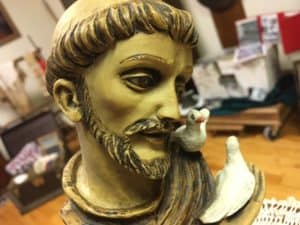Looking for some additional background on this coming Sunday’s Gospel? Consider this collaborative Franciscan Gospel post. This weekly Sunday Gospel reflection and questions are written by Fr. Paul Gallagher, OFM. They are edited by Sister Anne Marie Lom, OSF and Joe Thiel. The excerpts from the Sunday readings are prepared by Joe Thiel. If you would like to read or download the complete pdf with excerpts for your prayer, please click here: Franciscan Gospel Reflection Oct 22 2017 Excerpts from the Lectionary for Mass for Use in the Dioceses of the United States of America, second typical edition © 2001, 1998, 1997, 1986, 1970 Confraternity of Christian Doctrine, Inc., Washington, DC. Used with permission. All rights reserved. No portion of this text may be reproduced by any means without permission in writing from the copyright owner. Please include this information when printing.
Photos: St. Peter and Paul Church, Kiel, WI and Holy Family Convent Heritage Room
Matthew 22:15-21
[Then] the Pharisees went off and plotted how they might entrap him in speech. They sent their disciples to him, with the Herodians, saying, “Teacher, we know that you are a truthful man and that you teach the way of God in accordance with the truth. And you are not concerned with anyone’s opinion, for you do not regard a person’s status. Tell us, then, what is your opinion: Is it lawful to pay the census tax to Caesar or not?” Knowing their malice, Jesus said, “Why are you testing me, you hypocrites? Show me the coin that pays the
census tax.” Then they handed him the Roman coin. He said to them, “Whose image is this and whose inscription?” They replied, “Caesar’s.” At that he said to them, “Then repay to Caesar what belongs to Caesar and to God what belongs to God.” 
Background
In last week’s gospel Matthew recounts Jesus telling the parable of a king who prepared a wedding banquet for his son. As the parable unfolds, the king invites the good and the bad from the streets. When the guests are finally assembled, one is found without proper attire. The parable sets up the closing verse, “Many are invited, but few are chosen.” (Matt 22:14) The text for this Sunday’s gospel follows directly after last week’s text.
This Sunday, Matthew tells his readers that the Pharisees joined with the Herodians in an attempt to shame Jesus. The Pharisees did not approve of the Roman rule. Under normal circumstances they would not join with the Herodians, who were loyal to Rome. Among the common people there were some who longed for a rebellion that would overthrow the power of Rome. There were also those who had made peace with the situation, and there were even those who learned how to profit from Roman occupation.
The question before Jesus is based in the struggle between living what the Pharisees would understand as being faithful to God’s ways, or setting aside God’s ways in order to not cause a disturbance with the Roman authority. Because Jesus is a threat to both the Pharisees and the Herodians, they have come together to trap him. They begin by complimenting Jesus, but their goal is to protect their positions of power and authority.
Jesus’ response to them is to first ask to see the coin that is used to pay the tax. By producing the coin, they demonstrate that they are in possession of a coin that has the image of the roman emperor Tiberius, with the inscription “Tiberius Caesar, son of the divine Augustus, high priest.” The Pharisees would have been offended by hearing Augustus described as divine, and they considered such an image as a form of idolatry. Yet they have joined forces with the Herodians. When Jesus asks them whose image is on the coin and what is the title given, he is making them publicly acknowledge their breach of faithful adherence to the ways of God that they have been preaching. This is not the Jesus who quietly let those slip away who had accused the woman caught in adultery.
Reflection Questions
1. Can you recall a recent situation when you were being asked to take sides?
2. Has there been a time when you felt you needed to take a stand against something that was not right?
3. In the gospel, those who approach Jesus compliment him as a person who is not concerned with anyone’s opinion. Where in the gospels do you see examples of Jesus not being concerned with the opinions of others? Where is he a person who is very much concerned with the opinions of others?
4. They also say of him that he is not concerned with a person’s status. Where in the gospels do you find examples of Jesus’ disregard of a person’s status? Are there also places where he seems to be very concerned about the status of others?
5. Jesus says, in verse 21, to give to Caesar what belongs to Caesar and to God what belongs to God. What is it that does not belong to God?
6. When you are describing things like the place where you live, the automobile that you use, the shirt that you are wearing, do you use expressions like: my car, my house, my shirt?
7. Are there places where you are struggling with how to live in a right relationship to the material possessions that have been entrusted to you?
8. Can you take some time to talk with God about how you use possessions, how the opinions or the status of others affects you, or some other aspect of your living as a child of God in the real world in which you live?


